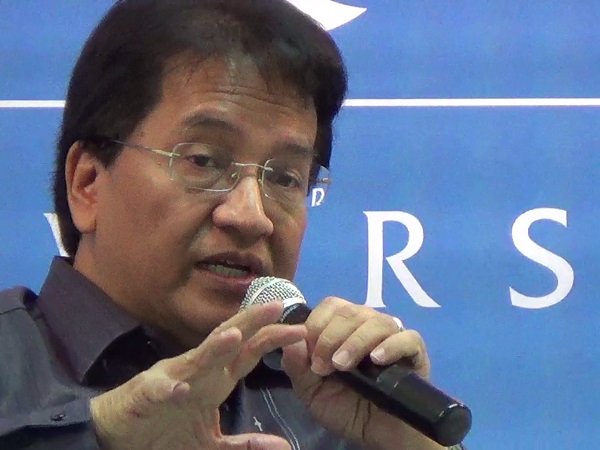Inquirer starts ‘Conversations’ on pork barrel
The Philippine Daily Inquirer launches “Inquirer Conversations” to allow the newspaper’s readers to react to and interact personally with invited guests to discuss issues of the day. For its first guest, Inquirer Conversations invited PDI columnist Cielito Habito to talk about the pork barrel scam at the Inquirer office in Makati City Wednesday, Sept. 25, 2013. Video by INQUIRER.net’s Ryan Leagogo
MANILA, Philippines – The Philippine Daily Inquirer (PDI) on Wednesday kicked off a forum series, dubbed “Inquirer Conversations,” with a discussion on the pork barrel scandal that has enraged the nation.

Former National Economic and Development Authority (NEDA) chief Cielito Habito. INQUIRER.net/RYAN LEAGOGO
Main speaker Cielito Habito, an Inquirer columnist and former National Economic and Development Authority (NEDA) chief, presented his views on the pork barrel and how the government should deal with it.
Inquirer CEO and President Sandy Prieto-Romualdez said the forum series aimed to engage readers in deeper conversations on issues covered by PDI’s articles and columns.
Life without pork
Article continues after this advertisementDuring the forum, Habito expanded the discussion on pork barrel “alternatives,” earlier mentioned in his column No Free Lunch.
Article continues after this advertisementHe based his lecture on the “supposed rationale” for the pork barrel.
“The President justifies it, early on before he actually gave in and decided to abolish the PDAF (Priority Development Assistance Fund), he said…it enables representatives to identify projects…that local government units cannot afford,” he said.
But Habito said the local government’s supposed insufficient Internal Revenue Allotment (IRA) should not be a “binding constraint” since national agencies have ways to understand and provide for the needs of local constituencies – through regional and local development councils, which involve the private business sector and civil society.
“Those are existing mechanisms in law that should theoretically [respond] to the needs of communities without having to ask a particular legislator to ‘play God,’ as if he is in the best position to know what is the need of the local community,” he said.
Habito said the “real rationale” of the pork barrel was a political one.
“Do we need to bribe our lawmakers to support good policies?” he asked.
Earlier, reports came out that the PDAF was allegedly being used by the administration to prod legislators into expediting and voting for key measures proposed in Congress.
Habito, who served under the Ramos administration, said the executive should just focus on the Legislative-Executive Development Advisory Council (LEDAC) instead of using PDAF to get a hold on lawmakers.
He said the LEDAC has in the past worked well because of the close coordination of the executive and legislative branches of government, resulting in the successful passage of important laws.
At the end of the lecture, Habito raised the question, “What would life without pork be?”
He said this “dream world” would have legislators focusing on lawmaking and only worthy candidates running for government positions, as opposed to politicians with “ulterior motives.”
Habito said local executives will then be recognized for convening local development councils while both national and local budgets will be drawn up with citizen participation.
“I would love to see line agencies being truly responsive to the basic needs of communities…so you don’t need people lining up in the offices of the politicians,” he said.
Change
“The only way to actually try and move forward [especially when it comes to the pork barrel controversy] is to continue sustaining this advocacy,” Habito said.
He said the people should keep on “sustaining the pressure” and not allow the issue to become just a “flavor of the month.”
“Inquirer is not allowing that to happen,” Habito said.
The Inquirer has been cited for its series of exposés on the P10-billion pork barrel scam, which later led to the snowballing of investigations and protests against involved politicians and bogus non-government organizations.
It is also the first to enlighten the public on the graft-ridden pork barrel through a 1996 award-winning exposé.
PDI Publisher Dean Raul Pangalangan, in his introductory speech, showed an old issue of the newspaper with the headlines “Congress kickbacks how much for whom?” and “MNLF occupies four more towns in Zamboanga.” An infographic of a roast pig also showed the parts of the pork barrel or the PDAF supposedly reserved for kickbacks for politicians, contractors and other involved groups.
“The date is August 13, 1996. You would think these were the headlines for today,” he said.
Prieto-Romualdez said the pork barrel scandal seemed to imply that some things have not changed.
But Habito said it has been “an important challenge to the Inquirer which keeps facing [the issue] head on. It also depends on the rest of us as well – sustaining the pressure (until we reach a conclusion).”
The Inquirer President said the forum series was a way to turn the PDI’s commitment into action.
“Only with a greater understanding can passion turn into a commitment. Only then can a commitment turn into action. And that’s what our ultimate mission is, [to become] a catalyst for social progress and change,” she said.
Related Story: